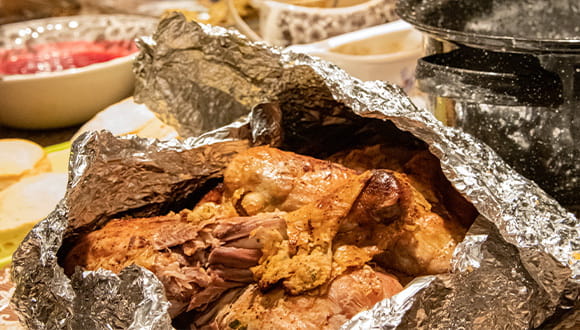How Long Do Leftovers Last in the Fridge?
Nov. 23, 2021 - Katie McCallumYou don't always have to worry about how long leftovers can sit in your fridge. They're often repurposed as lunch the next day and particularly desirable leftovers may even get polished off that same night as a snack.
Other times, though, leftovers are either so plentiful or boring that they sit in the fridge for a while. This is especially common after, say, Thanksgiving, when the amount of uneaten food can seem endless — or with veggies that you really only cooked to keep from throwing them away.
Whether it's turkey, pizza, chicken, steak, ground beef, stew, pork, pasta, fish, vegetables or something else, we've all asked: How long will that last in the fridge? And we all have our personal guesses, usually uninformed, as to how long might be too long.
But, food safety — even when it comes to cooked foods — isn't a subject to be uncertain about. Foodborne illness is serious and can come with symptoms that range from uncomfortable and inconvenient to life-threatening.
Are leftovers good after 5 days?
Nope.
According to the FDA, leftovers are safe in the fridge for up to three to four days.
This means Thanksgiving leftovers should be consumed by Monday. And any food that's part of the meal prepping you did on Sunday needs to be eaten by Thursday.
These guidelines may seem strict, but they'll keep you and your family safer from food poisoning.
Refrigeration slows the growth of illness-causing germs, but it doesn't kill them. Any germs that may be contaminating your leftovers — either small amounts that might remain after the cooking process or grew while the food was sitting out prior to being refrigerated — may have multiplied to dangerous levels after spending more than four days in your fridge.
What's more, because you can't see or even always smell these germs, there's no way to know if your leftovers have become unsafe to eat or not — meaning that, after four days, you should operate under the assumption they're not safe.
Depending on the germ causing the foodborne illness, the symptoms of food poisoning can range from mild to severe and include:
- Nausea
- Abdominal cramps
- Vomiting
- Diarrhea
- Fever
Ultimately, leftover safety may be fairly complicated and vary depending on how the food was prepared, how it was stored and what the item in question is. But these aren't factors that we can sort through safely at home.
Therefore, the FDA's advice is the safest advice — no matter the food: Consume or freeze leftovers within four days.
Plus, from a freshness standpoint, are leftovers even really tasty after four days? Probably not.
5 tips for safely eating leftovers
Leftover safety starts with how food is prepared.
If you're ordering a meal from a restaurant, you have less control over this — although you can take steps like never ordering a medium rare hamburger or undercooked fish.
If you're cooking at home, always be sure to wash your hands, properly wash produce, keep raw meat and veggies separate during meal preparation and cook meat, fish and eggs to the correct internal temperature.
And for any food you don't eat right away, follow these leftover safety tips:
- Refrigerate leftovers quickly. After being cooked, perishable food should be refrigerated within two hours. If the temperature is 90º Fahrenheit or higher, food should be refrigerated within one hour.
- Throw away leftovers left unrefrigerated for too long. No one wants to waste food, so be sure to heed the advice above. For instance, during those warmer months when your car gets hot, make sure to run your errands before eating at a restaurant from which you might leave with a doggie bag.
- Use airtight, shallow containers to store food. Sealing your leftovers can help keep illness-causing bacteria out. And to help limit how long food stays in the "danger zone" (between 40-140º Fahrenheit), help it cool more quickly by placing it in a shallow container. Split larger portions between two different containers.
- Freeze or consume leftovers within four days. If your leftovers are getting close to hitting their prime, move them to a sealed container and place them in the freezer. Once frozen, leftovers remain safe indefinitely — although food quality can suffer between two and six months later. Safely thaw leftovers in the refrigerator and, after thawing, eat them within 3 to 4 days — or refreeze them.
- Reheat leftovers properly. Before eating leftovers, be sure to reheat them to an internal temperature of 165º Fahrenheit. If you're using a microwave to reheat your food, rotate or stir the leftovers halfway to ensure that food reheats evenly.
Lastly, when in doubt, throw it out.








